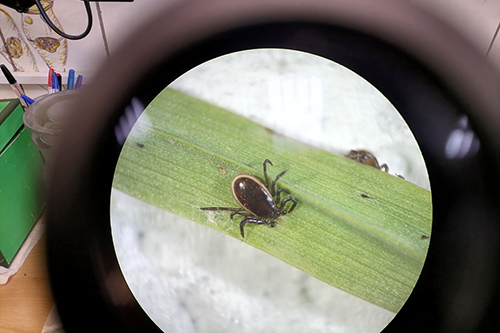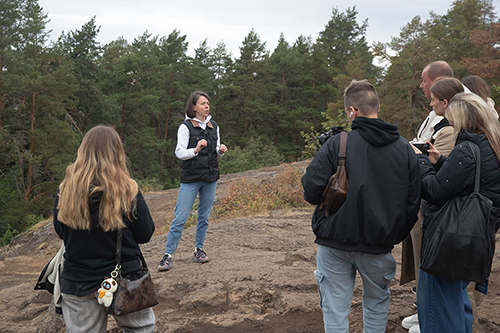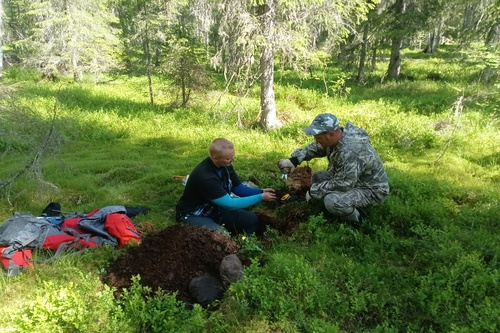News

January 26, 2021
Karelian scientists assessed the effects of annual tourist traffic on the forest cover and soils in and around the White Sea petroglyph sites. They found that intensive trampling threatens the local forest ecosystems. Based on the results of the study, the specialists produced recommendations on how to conserve the ecosystems.
Staff of the Forest Research Institute of the Karelian Research Centre RAS visited the cultural heritage site “White Sea petroglyphs” to find out how the condition of its forest ecosystems has changed under tourism impact. This was the first study of this kind in the area. Its results were published in a recent issue of the "Bulletin of Higher Educational Institutions. Lesnoy Zhurnal"
See also:

September 2, 2025
Scientists exploring for fungal strains capable of controlling ixodid tick numbers
Karelian scientists have conducted an experiment where taiga ticks (Ixodes persulcatus) were infected with various strains of entomopathogenic fungi – parasites that affect many groups of arthropods. The strain collected from Bolshoy Solovetsky Island in the White Sea proved to be the most effective: tick mortality in this treatment was 45% on the seventh day and rose to 95% on the eleventh day. The results can be used to develop biologics for controlling the numbers of the main vector of dangerous diseases.
Karelian scientists have conducted an experiment where taiga ticks (Ixodes persulcatus) were infected with various strains of entomopathogenic fungi – parasites that affect many groups of arthropods. The strain collected from Bolshoy Solovetsky Island in the White Sea proved to be the most effective: tick mortality in this treatment was 45% on the seventh day and rose to 95% on the eleventh day. The results can be used to develop biologics for controlling the numbers of the main vector of dangerous diseases.

August 26, 2025
Scientists of KarRC RAS introduce federal and regional mass media to their research objects
Journalists from federal and regional mass media learned about the objects studied by researchers of the Karelian Research Centre RAS on the “Journey to Science. Karelia” press tour organized by the National Priorities NPO. A part of the National Science and Technology Decade is the popular-science tourism program, which gives its participants a chance to actually see how domestic science is developing and to visit research laboratories and fieldwork sites.
Journalists from federal and regional mass media learned about the objects studied by researchers of the Karelian Research Centre RAS on the “Journey to Science. Karelia” press tour organized by the National Priorities NPO. A part of the National Science and Technology Decade is the popular-science tourism program, which gives its participants a chance to actually see how domestic science is developing and to visit research laboratories and fieldwork sites.

August 21, 2025
Geographer’s Day in an unconventional way at KarRC RAS Environmental Research Museum
Geographer’s Day is celebrated in Russia on August 18th, honoring the foundation of the Russian Geographical Society (RGS) on this day in 1845. So this year is the RGS’s 180th anniversary. In Karelia, the date is also a round-number anniversary — the local RGS branch was founded 80 years ago. To befit the date, Karelian geographers celebrated it in a special manner: an open lecture series was held at the Museum of Applied Environmental Research KarRC RAS.
Geographer’s Day is celebrated in Russia on August 18th, honoring the foundation of the Russian Geographical Society (RGS) on this day in 1845. So this year is the RGS’s 180th anniversary. In Karelia, the date is also a round-number anniversary — the local RGS branch was founded 80 years ago. To befit the date, Karelian geographers celebrated it in a special manner: an open lecture series was held at the Museum of Applied Environmental Research KarRC RAS.

August 14, 2025
Karelian scientists resume observations of forest ecosystems in Paanajarvi National Park
Scientists from the Department for Multidisciplinary Research KarRC RAS went on an expedition to the Paanajarvi National Park, where they explored Arctic biodiversity and could compare the development of north-boreal ecosystems in a pristine area not affected by human activities and in forests with more noticeable human impact.
Scientists from the Department for Multidisciplinary Research KarRC RAS went on an expedition to the Paanajarvi National Park, where they explored Arctic biodiversity and could compare the development of north-boreal ecosystems in a pristine area not affected by human activities and in forests with more noticeable human impact.



